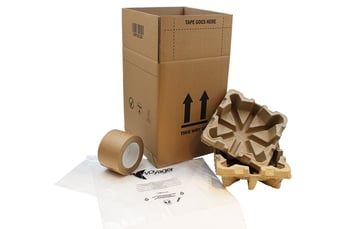One cracked tin or a leaking drum of paint can ruin a pallet, stall a delivery, and cost a manufacturer far more than the price of the container itself. Packaging failures are rarely small hiccups. They spread across the supply chain, leaving waste, delays, and reputational scars.
The reality is that paint packaging has to do far more than hold liquid in place. It has to withstand pressure during stacking, jolts in transport, and even the rough edges of real-world handling. When it doesn’t, the problems are swift and expensive. What looks like a minor crack or loose seal on the surface can snowball into lost stock, strained customer relationships, and even regulatory issues.
That’s why packaging for paints and coatings deserves as much strategic thought as the product itself. Manufacturers who overlook this risk often discover that cutting corners on containers ends up costing them in areas they didn’t expect.
The Hidden Costs of Poor Packaging
It’s easy to look at packaging as a background cost, something to hold the real product in place. But in paint manufacturing, the packaging is part of the product experience. If it fails, the fallout is costly.
Leaks Mean Product Loss
Paint is heavy, messy, and unforgiving when it escapes. In fact, damaged tins can easily ruin an entire pallet. On top of the lost goods, there’s the added cost of handling hazardous waste and cleaning up the aftermath. In some cases, the transport vehicle itself needs costly remediation.
Contamination Causes Rejections
Even minor leaks can leave other goods stained, sticky, and unsellable. As you can imagine, a distributor who receives a shipment covered in paint residue is unlikely to gamble on product integrity. They will reject the whole lot. The cost of lost stock pales compared to the reputational damage of being seen as unreliable.
Compliance Failures Carry Penalties
In many contexts, paint is classified as a hazardous material, which means packaging is held to strict standards. Therefore, if you choose to use containers that fail to meet regulations, you run the risk of fines, shipment rejections or even legal action. It’s for that reason that businesses have to ensure packaging complies with rules such as the ADR regulations for transporting dangerous goods and COSHH requirements for handling hazardous substances. A single compliance failure has the potential to put future contracts at risk.
Inefficiency slows the supply chain
Unfortunately for businesses, a rejected or delayed pallet rarely exists in isolation. It holds up transport schedules, delivery slots, and sometimes even downstream production lines. One weak seal can result in missed deadlines and lost opportunities across the chain.
Reputation and trust
Suppliers do not remember the 99 pallets that arrived in good condition. They remember the one that leaked. Reliability is built in small, repeated moments. Inconsistent packaging breaks that trust, casting doubt on every future delivery.
And in manufacturing, perception counts. A buyer making decisions under pressure is more likely to lean toward a supplier they never have to second-guess. Poor packaging turns into a reputational stain that no discount can easily erase.
The ESG connection
It may be obvious that the cost of poor packaging is not just measured in money. Every rejected pallet represents wasted resources: the materials, the paint itself, and even the energy required to produce and transport it. Add to that the additional emissions caused by re-shipping replacements, and you begin to see the environmental toll.
For manufacturers working toward ESG targets, durable and sustainable packaging is much more than a “nice to have.” It showcases your responsibility, cuts waste and shows regulators, investors, and customers that sustainability commitments extend across the supply chain.
PaintGuard™: built for protection

PaintGuard™ has been developed with durability at its core. It is not just about keeping paint in the tin. It is about ensuring containers can withstand transport stress, temperature shifts, and stacking pressures without compromise.
PaintGuard™ is robust, strong and also designed with sustainability in mind. Materials are chosen for recyclability and efficiency, reducing environmental impact without sacrificing performance. As such, manufacturers investing in packaging that’s reliable, safe, and future-proof serve to reduce long-term costs and keep their ESG goals intact.
Closing thought
Strong supply chains are built on strong packaging. With PaintGuard, manufacturers can protect product, profit, and planet in one step.
We are here to help you find the right solution for your packaging challenges. Send a message, email sales@allpack.uk.com, or call 01543 396 700.